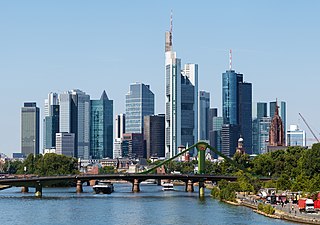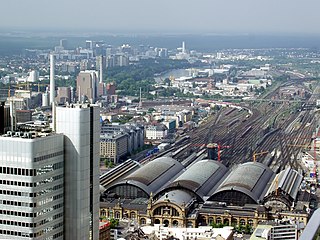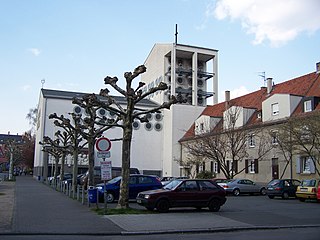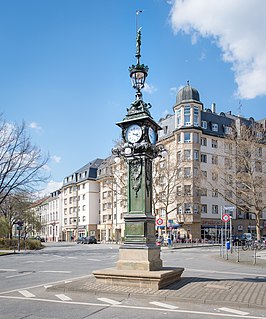
Frankfurt, officially Frankfurt am Main, is the most populous city in the German state of Hesse. Its 763,380 inhabitants as of 31 December 2019 make it the fifth-most populous city in Germany. On the river Main, it forms a continuous conurbation with the neighboring city of Offenbach am Main and its urban area has a population of 2.3 million. The city is the heart of the larger Rhine-Main Metropolitan Region, which has a population of 5.5 million and is Germany's second-largest metropolitan region after the Rhine-Ruhr Region. Frankfurt's central business district lies about 90 km (56 mi) northwest of the geographic center of the EU at Gadheim, Lower Franconia. Like France and Franconia, the city is named after the Franks. Frankfurt is the largest city in the Rhine Franconian dialect area.

The public transit system in Frankfurt is part of the Rhein-Main-Verkehrsverbund transport network and consists of several carriers who all use the same fare system. Therefore, one ticket is valid for a journey which may include several modes of transit run by different operators. The fares are paid in advance of travel at a ticket vending machine or at the driver on board a bus. There are no turnstiles or other controlling barriers; instead, a proof-of-payment system is used. Plainclothes fare inspectors are employed and carry out random checks to ensure passengers have paid. If found to be travelling without a ticket, then they are required to pay a fine of €60. A single way trip within Frankfurt costs between €1.80 and €2.80, and a journey to the suburbs outside Frankfurt costs between €4.65 and €9.10 approx. There are also some discounts for children for groups or day tickets. A day ticket for traveling within Frankfurt costs €7.

Fußballsportverein Frankfurt 1899 e.V., commonly known as simply FSV Frankfurt, is a German association football club based in the Bornheim district of Frankfurt am Main, Hesse and founded in 1899. FSV Frankfurt also fielded a rather successful women's team, which was disbanded in 2006.

Frankfurt (Main) Hauptbahnhof, often abbreviated as Frankfurt (Main) Hbf and sometimes translated as Frankfurt central station, is the busiest railway station in Hesse, Germany. The affix "Main" comes from the city's full name, Frankfurt am Main. Because of its location near the middle of Germany and usage as a transport hub for long and short distance travelling, Deutsche Bahn refers to it as the most important station in Germany.

The PSD Bank Arena is a multi-use stadium in Bornheim, a district of Frankfurt am Main, Germany, and is best accessed by the Johanna-Tesch-Platz U-Bahn station, or the Eissporthalle/Festplatz station. It is currently used mostly for football matches and is the home stadium of FSV Frankfurt and occasionally used to host 1. FFC Frankfurt. It has a capacity of 12.542.
The U-Bahn Line B is the second line in the network of the Frankfurt U-Bahn. It leads in west-east direction from the central railway station (Hauptbahnhof) over the old town to Konstablerwache, where it splits into two branches to Bornheim and Preungesheim. Originally planned as an independent main line, the D line represents an extension of the U4 to Bockenheimer Warte from the central railway station.

Lonsheim is an Ortsgemeinde – a municipality belonging to a Verbandsgemeinde, a kind of collective municipality – in the Alzey-Worms district in Rhineland-Palatinate, Germany.
Holy Cross Church, or variants thereof, may refer to:

The Diocese of Limburg is a diocese of the Catholic Church in Germany. It belongs to the ecclesiastical province of Cologne, with metropolitan see being the Archdiocese of Cologne.

The Holy Cross Church is a Catholic church in the Bornheim district of Frankfurt am Main (Germany). It is similar in design to the Frauenfriedenskirche in Frankfurt-Bockenheim. It was built by Martin Weber from 1928 to 1929, on a rise then known as Bornheimer Hang. The church is an unusual example of interwar modernism as sacred Bauhaus architecture.

The Frankfurt am Main tramway network is a network of tramways forming a major part of the public transport system in Frankfurt am Main, a city in the federal state of Hesse, Germany.
Martin Weber was a German architect who designed Catholic churches.

The Line C is a line on the Frankfurt U-Bahn. It consists of the U6 and the U7.
The following is a timeline of the history of the city of Frankfurt am Main, Germany.
Bornheim may refer to several places in Germany:

The Holy Cross - Centre for Christian Meditation and Spirituality is an institution of the Roman Catholic Diocese of Limburg, Germany. It is based at the Holy Cross Church in Frankfurt-Bornheim and is dedicated to services, contemplation, meditation, retreats, counseling, and other events such as concerts.

Maria Rosenkranz is a Catholic church in Frankfurt-Seckbach, part of Frankfurt am Main. It was completed in 1953. On 1 January 2015 the parish became a Kirchort, part of the parish St. Josef Frankfurt am Main. The parish church of the Seckbach congregation is part of the Roman Catholic Diocese of Limburg.

Heilig Geist is the name of a Catholic church in the suburb Riederwald of Frankfurt am Main, Hesse, Germany. The parish church of the Riederwald congregation is part of the Roman Catholic Diocese of Limburg. On 1 January 2015 the parish became a Kirchort, part of the parish St. Josef, Frankfurt.

Frankfurt am Main II is an electoral constituency represented in the Bundestag. It elects one member via first-past-the-post voting. Under the current constituency numbering system, it is designated as constituency 183. It is located in southern Hesse, comprising the eastern part of the city of Frankfurt am Main.

Uhrtürmchen is a protected monument in Frankfurt am Main, Germany, located at the corner of Friedberger Anlage near the Zoo. It is one of only two remaining clock towers in the city, the other being located in Bornheim, and is the oldest surviving one, having been first erected in the 19th century. Today the tower serves as a popular tourist attraction, as well as a meeting point for people in the city.



















